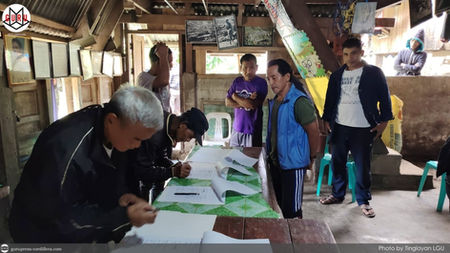

‘Dagijay gumatgatang ti natakaw ket mabalin da nga makasuhan ti Anti-Fencing Law’ – HPG-Kalinga Chief Bongat warns buyers of stolen vehicles
Tabuk City, Kalinga – Accountability in carnapping does not fall solely on thieves but also on individuals who buy stolen vehicles, according to Police Captain Jordan Bongat, Chief of the Highway Patrol Group–Kalinga (HPG-Kalinga). Bongat made the statement during an interview with Guru Press Cordillera on December 15, 2025, following the successful arrest of the Top 2 and Top 3 Most Wanted Persons in Kalinga earlier this month for motorcycle theft. The suspects, known by the

Mark Moises Calayan
10 hours ago2 min read


‘…parang ’di ko mailabas ang buong potensyal ko sa pagtakbo kapag hindi ako nakapaa’ – 30-yr.-old ‘Barefoot Runner’ from Isabela finishes 100 miles Ultramarathon
Baguio City, Philippines – Defying safety norms that often require runners to wear shoes, a 30-year-old man dubbed the “Barefoot Runner” stunned the endurance sports community after completing the grueling 100-mile Baguio–Sagada Ultramarathon completely barefoot. Held from December 5 to 7, the event was organized by Slowfoot Runner Events Management (SREM). The race started at the Rizal Monument in Burnham Park, Baguio City, at midnight on December 6 and ended in Sagada, Moun

Lorraine Bacullo
10 hours ago2 min read


54 iKalinga cops among over 10,000 police officers promoted this December
Tabuk City, Kalinga – Fifty-four police officers from Kalinga were among more than 10,000 personnel nationwide who were promoted during the Philippine National Police’s (PNP) simultaneous oath-taking, rank-donning, and pinning ceremony held during the flag ceremony conducted by the Special Action Force at the HSAF Gymnasium, Fort Sto. Domingo, Sta. Rosa City, Laguna, on December 15, 2025. According to the PNP, a total of 10,297 personnel were promoted, including 474 police co

Lorraine Bacullo
10 hours ago1 min read


35-yr.-old man shot dead in Abra; killer still at large
Tabuk City, Kalinga – An unidentified gunman killed one man after indiscriminately firing at a group of men having a drinking session in front of a barber shop in Pidigan, Abra, on Saturday night, December 13, 2025. The fatality was identified by Abra police as Sam Bachiller, a resident of Barangay Dalimag, San Isidro, Abra. CCTV footage showed the group drinking that evening when shots were fired at around 9:00 p.m. Police reports, cited by local media, indicated that the gu

Mark Moises Calayan
10 hours ago2 min read


Butbut and Betwagan tribes extend ceasefire for two months
Tinglayan, Kalinga — With no final agreement yet on the sipat, the Butbut and Betwagan tribes have agreed to extend their ceasefire for another two months, committing to refrain from any hostilities or armed conflict during the period. The Butbut tribe of Tinglayan, Kalinga, and the Betwagan tribe of Sadanga, Mountain Province first signed a ceasefire agreement during a gathering of the two tribes hosted by the Tongrayan community in Poblacion on September 27, 2025. The agree

Leonora Lo-oy
10 hours ago1 min read


iKalinga Fighter Jean Claude Saclag wins bronze in 2025 SEA Games, dedicates medal to country, family, and sick daughter
Tabuk City, Kalinga – iKalinga fighter Jean Claude Saclag is no stranger to the Southeast Asian Games, but his participation in this year’s event marked a special moment in his sporting career. He was not only fighting for the Philippine flag; he was also throwing kicks and punches in the ring for his daughter, who was confined in the hospital. Saclag, a three-time SEA Games gold medalist, is one of the 1,500 Philippine delegates in the 33rd SEA Games currently being held i

Leonora Lo-oy
1 day ago2 min read


‘Mabalin makulong (ti Parents) nu diay ubing da na-involve ti aksidente wenno adda violations da’ – HPG PSSg Pelobello on liabilities of allowing minors to ride motorcycles
Tabuk City, Kalinga – For many students in Kalinga today, riding motorcycles has become the most convenient way to get to school, especially for those living in far-flung areas with limited transportation options. Police Staff Sergeant Omar A. Pelobello of the Provincial Highway Patrol Group (HPG-Kalinga) said this is the most common reason parents cite for allowing their children to ride motorcycles. Despite the good intention, HPG personnel expressed concern over the safety

Mark Moises Calayan
1 day ago2 min read


Rare Cloud Rat ‘Boot’ reappears in Balbalasang, Balbalan after 10 Years since last sighting
Banao, Balbalan – After a decade of absence in the treetops of northern Luzon, particularly in Banao Tribe, Balbalan, the rare cloud rat locally known as “boot” has been sighted once more in the forests of the Banao Protected Landscape (BPL), marking its first confirmed appearance in 10 years. The rare cloud rat was featured during the documentation of GMA Network’s wildlife program Born to Be Wild (BTBW), whose team traveled deep into the forests of Banao. The episode aired

Lorraine Bacullo
1 day ago2 min read


Top 2 Most Wanted in Kalinga arrested
Tabuk City – The Tabuk City Police Station (Tabuk CPS) arrested the top two most wanted persons in Kalinga Province on December 12, 2025, following the issuance of arrest warrants by the Regional Trial Court, Second Judicial Region, Branch 25, for carnapping, with no recommended bail. “Duwa da dagita nga naarest at the same date for carnapping. Diay maysa natiliw tayo idiay Nambaran. The other natiliw ti Tabuk City Police,” said HPG-Kalinga Chief PCPT Jordan Bongat in an inte
Brent Martinez
1 day ago2 min read


‘...inserve tayo diay warrant of arrest ken diay suspect, ket natiliw mi diay Nambaran’ – HPG-Kalinga PCPT Bongat
Tabuk City, Kalinga – The 21-year-old carnapping suspect in Tabuk City, Kalinga, was apprehended by the Provincial Highway Patrol Group (HPG-Kalinga), led by Police Captain Jordan Bongat, earlier this December. The suspect, known under the alias “Bogs,” was listed as the Top 3 Most Wanted Person in Kalinga and was arrested during an anti-carnapping operation in Barangay Nambaran, Tabuk City, on December 12, 2025. In an interview with Guru Press Cordillera on December 15, Bong

Mark Moises Calayan
1 day ago2 min read


TANUDAN RUN 2025: 185 runners, nature enthusiasts ready to witness launching of Tawang Falls
Tanudan, Kalinga – At least 185 runners and nature enthusiasts are all set to witness the official launching of the Tawang Falls in Pangol through the ‘Tanudan Run’ 2025 scheduled this coming Saturday, December 20. Tawang Falls is a natural waterfall in Tanudan, Kalinga, valued by local communities. It features cascading freshwater from upland forests, forming cool pools amid dense vegetation and rock formations. The serene site serves as a water source, heritage, and potenti

Leonora Lo-oy
2 days ago2 min read


Young Man from Tanudan, Kalinga among 330 graduates of Australian Defence Force Academy in 2025
Baguio City, Philippines – An iKalinga pride from Tanudan, Kalinga is among the graduates of the Australian Defence Force Academy (ADFA) under the University of New South Wales (UNSW) Class of 2025, who completed their studies on December 11, 2025, in Canberra, Australia. According to official information, 330 trainee officers graduated after completing their three-year military and academic programs. Among that cohort, 18 were international students from various countries, i
Mark Jordan Bomogao
2 days ago2 min read


“We need to relocate Lubo Elementary School, and we need funding. Isunga napan tayo DepEd Central Office nagdawat tulong...” - Tanudan Mayor Jaedicke Rhoss Dagadag
Tanudan, Kalinga – With Super Typhoon Uwan leaving Lubo Elementary School unsafe for learners, Mayor Jaedicke Rhoss Dagadag personally visited the Department of Education (DepEd) Central Office to request the urgent allocation of funding for the construction and permanent relocation of the school. “We need to relocate Lubo Elementary School, and we need funding. Isunga napan ta DepEd Central Office nagdawat tulong,” Mayor Dagadag said in a phone interview with Guru Press Cord

Tanudan LGU
2 days ago2 min read


ONLY 21 years old and up are allowed to buy/use firecrackers — BFP-Kalinga reminds public
Tabuk City, Kalinga — In accordance with Oplan Paalala: Iwas Paputok, the Bureau of Fire Protection (BFP) has reminded the public that only individuals 21 years old and above are allowed to use firecrackers. The agency also emphasized that purchases should be made exclusively from authorized selling areas, further intensifying its campaign to ensure the safe and responsible use of firecrackers during the holiday season. In a report by the BFP Central Office, the number of fir

Lorraine Bacullo
2 days ago2 min read


“…Instead nga paputok, why not beat the gong? (Agpapat-tong tayo lattan)” – PCAPT Manganip on Safer Holiday and New Year Celebrations
Tabuk City, Kalinga — As the Yuletide season is celebrated, authorities in Kalinga are urging the public to choose safer and culturally rooted ways of welcoming the holidays and the New Year. Residents are encouraged to use the gangsa, a traditional gong, instead of lighting firecrackers to prevent injuries and accidents. According to the Department of Health–Cordillera (DOH-CAR) firework-related injury report, Kalinga recorded 13 firecracker-related injury cases during the C

Lorraine Bacullo
2 days ago2 min read

.png)











































































Comments